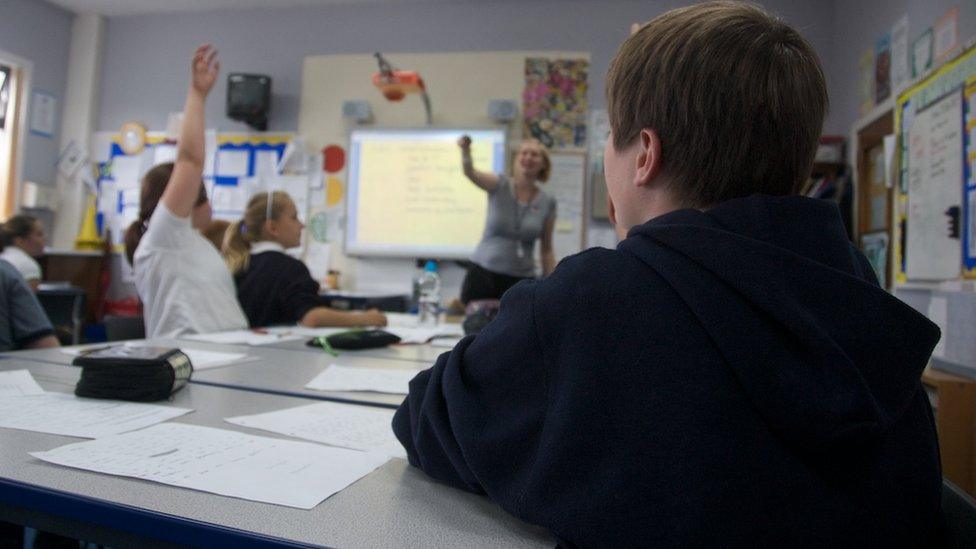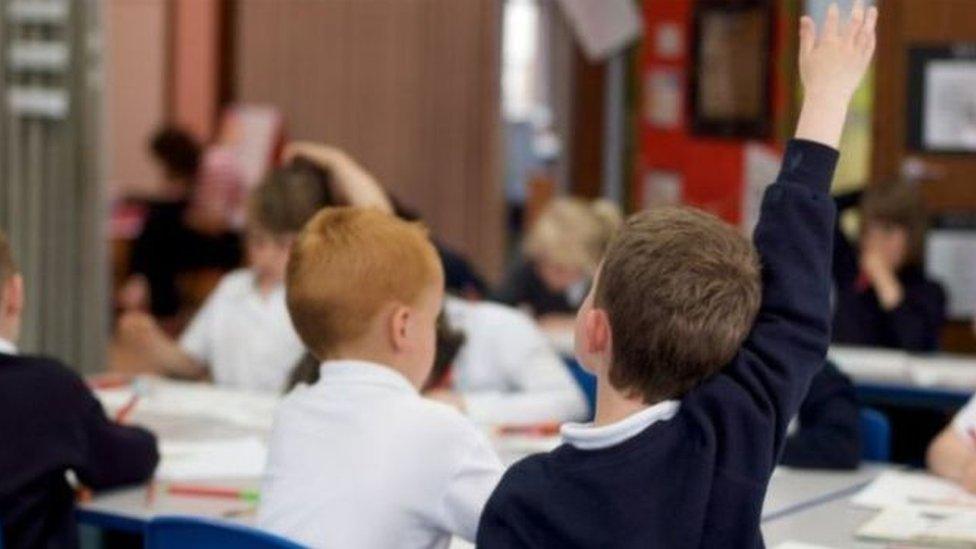Teachers gather in Perth for annual EIS conference
- Published

Teachers are gathering in Perth for the annual conference of Scotland's largest education union.
Delegates at the EIS conference are likely to feel emboldened after securing a large pay rise amid the threat of a strike.
But they still have other concerns which they would like to see addressed including their workload.
Another major topic for discussion will be the impact of tight budgets on aspects of education.
A total of 59 motions will be debated at the three-day meeting - the union anticipates that concern about excessive workload demands is likely to be a recurring theme.
The union has published details of a survey of more than 12,000 teachers which suggests that six out of 10 full time teachers work more than eight hours above their contracted hours each week.
One motion at the conference says teachers should have to spend no more than 17.5 hours a week in class to give them more time to prepare lessons and mark work.
Strike ballot averted
EIS General Secretary Larry Flanagan said: "Teachers are working many additional hours over and above their contractual commitments, with serious impact on their family life and on their mental and physical wellbeing.
"The EIS welcomes the commitments to reduce workload that were written into the recent Scottish Negotiating Committee for Teachers agreement on teachers' pay - and we now expect local authorities and the Scottish government to make quick progress in delivering those commitments."
In March, a strike ballot was averted at the eleventh hour when teachers' unions - led by the EIS - secured a three-year pay deal worth 13.5%. The agreement also included a commitment to tackling high workload.

In some respects, education has been protected from some of the pressure on public finances but the union still has serious concerns.
Mr Flanagan added: "For the past decade, the UK-wide policy of enforced austerity has had a serious impact on the provision of public services.
"Scottish education has endured a painful period of deep cuts to funding, resourcing and staffing which has had a serious impact on the learning and teaching environment in our schools.
"This year's AGM will highlight the damaging nature of cuts on nursery education, provision of education for young people with additional support needs, the loss of subject specialist teachers and the increase in shared head teachers working across more than one school."
Students' best interests
The level of help available to students with additional support needs - which can range from short-term issues like coping with bullying or bereavement to lifelong challenges such as autism - can vary from area to area. The presumption is that students with additional support needs should remain within a mainstream school as far as possible.
Few would question this as a principle - but there are worries about the level of help available to students and regular teachers and a fear that some decisions are being driven by money rather than the student's best interests.
Funding for schools is a complex business. Essentially, councils decide just how much to spend on schools but have to work within national agreements and frameworks. More broadly, councils are heavily dependent on the Scottish government for cash.
Meanwhile, the Scottish government also gives additional funding to some schools and councils to help them close the poverty-related attainment gap.

But there is more to running an education service than employing teachers and buying educational resources - a survey of EIS members suggests some are feeling the impact of tight council budgets in other ways.
One concern is school cleaning. A union survey with respondents from 700 schools suggested 80% of schools had seen a reduction in the frequency or quality of cleaning in the past three years because of council budget cuts.
It was claimed that many schools are not cleaned at all on certain day and that toilets had been left dirty.
The issue of council funding touches on another issue likely to come up. Next year, councils gain two additional powers to raise money - the transient visitor levy or "tourist tax" and the right to introduce charges on workplace parking.
The union wants schools to be exempted from the workplace parking scheme.
Councils will not decide for several months whether to introduce these charges - but any which do so are likely to provoke intense local debates.

So while EIS delegates are likely to wish to celebrate their success in securing a large pay rise without resorting to strike action, the union still has concerns which it wants to see addressed.
However, these should be seen in context.
While there is no doubt the relationship between the EIS and the government became strained over pay, the underlying relationship remains positive and constructive - even where there are real disagreements such as over standardised assessments in Primary One.
The issue for the EIS is not whether Scottish education needs radical reform and many in the union feel newspaper headlines which speak of a "crisis in the classroom" are both misleading to parents and damaging to the profession.
Rather, their concern is about whether teachers and others have the support and resources to do their jobs properly and play their full part in trying to improve a vital public service.
- Published27 March 2019

- Published8 March 2019
